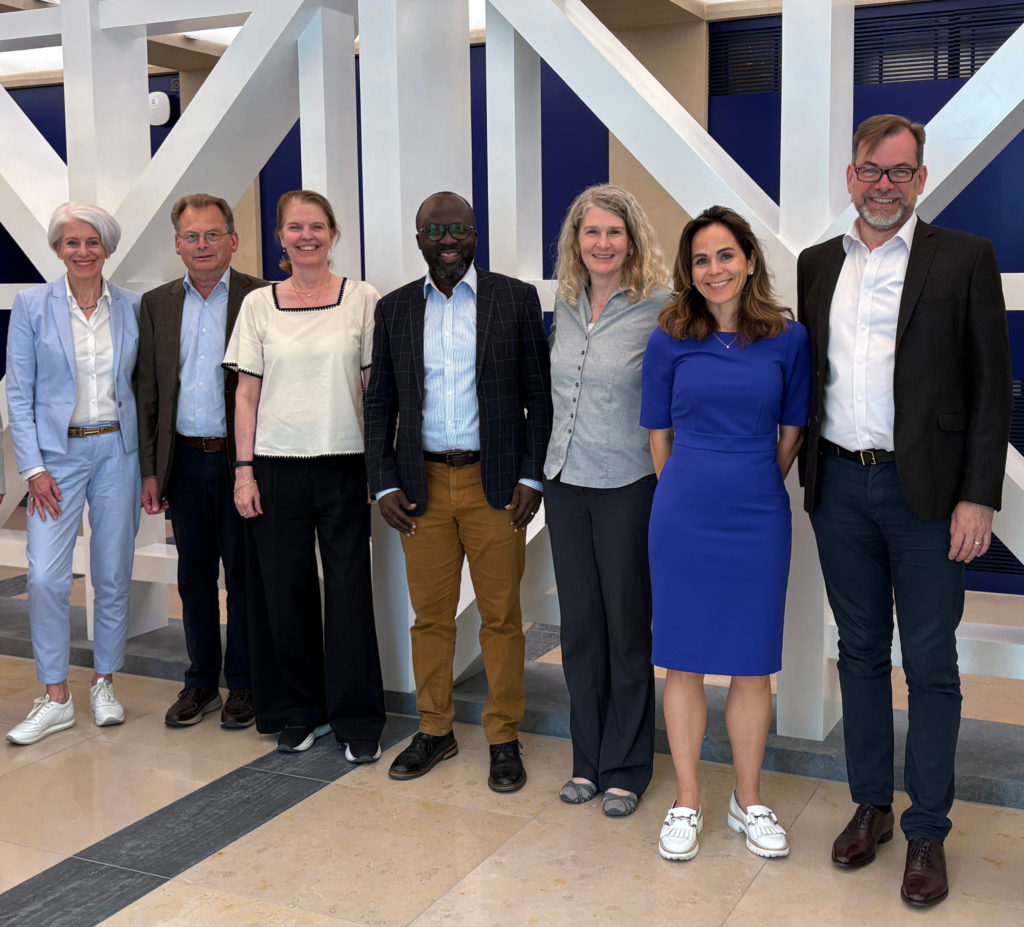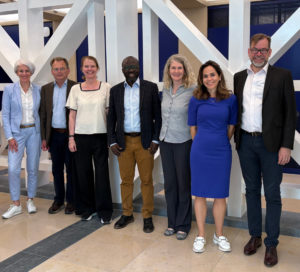Our Organization
The Hunger Project Worldwide
The Hunger Project (THP) is an internationally active non-profit organization founded in 1977. Recognized by the United Nations as a non-governmental organization (NGO) with consultative status at the UN Economic and Social Council, THP is dedicated to sustainably ending chronic hunger and significantly reducing extreme poverty.
Strategic direction is set by the Global Board, comprised of renowned experts in development cooperation and the financial sector. Appointed in 2025, Rowlands Kaotcha is President and CEO of the global Hunger Project.
The Hunger Project Switzerland
The Hunger Project Switzerland was established in 1983 as a non-profit, non-denominational, and politically independent association in Geneva. As part of the global THP movement, we operate as an independent NGO and are tax-exempt due to our charitable status. We have held ZEWO certification since 2009—a mark of quality for the transparent, efficient, and impact-oriented use of donations.
Our members and donors support projects specifically selected by us from the portfolio of the global Hunger Project, particularly in Africa. Through innovative approaches and long-term, effective programs, we are committed to addressing the root causes of hunger and empowering people to lead self-determined lives.
All contributions and donations are used in accordance with our statutes:
THP By-law
Our Board
Our voluntary board is composed of dedicated individuals with diverse experience in development cooperation and the private sector. Their expertise spans strategy and business development, finance, law, human resources, marketing, and sustainability.
Together, they bear strategic responsibility for The Hunger Project Switzerland and ensure that our vision of a world without hunger is pursued with clarity, competence, and commitment.

Rowlands Kaotcha (President & CEO THP global) visiting Switzerland . From left: Susanne Simon, Andreas Ragaz, Katja Fechteler, Rowlands Kaotcha, Alexandra Koch, Christine Brunel-Ligneau, Tom Waterhouse (missing: Daniel Heini; Kristina Lasotta)


Corporate Fundraising

Law and Governance
Our board is supported by an experienced Advisory Board:
Dr. rer. nat. Christian Auer – Epidemiologist
Oliver Fueter – Radio Journalist and Speaker
Max J. Koch – former vice director of a transport company
Ursula Willimann – Translator
Our Management and Team
The operational management of The Hunger Project Switzerland is led by our Co-Managing Directors, Alexandra Koch and Katja Fechteler. Together with a dedicated team, they implement the board’s strategy and ensure that our projects have a lasting impact.

Alexandra Koch – lic. rer. pol., MBA
Co-Managing Director
Co-Managing Director
Marion Massouline – Head of Marketing & Communication
Stephanie Meyer – Accounting & Fundraising
Nadja Jung – Digital Fundraising & Communication
Aline Kunz – Project Management & Volunteer Coordination
Ambassador

Mona Petri – Actress
Volunteers
The Hunger Project Switzerland benefits from the tireless commitment of dedicated contributors who, like the members of the Board and Advisory Board, serve in a voluntary capacity. This approach fosters a culture of personal responsibility, initiative, and connection. At the same time, it helps keep personnel costs low, ensuring that the majority of funds donated go directly to project work.
Our Organization
The Hunger Project Worldwide
The Hunger Project (THP) is an internationally active non-profit organization founded in 1977. Recognized by the United Nations as a non-governmental organization (NGO) with consultative status at the UN Economic and Social Council, THP is dedicated to sustainably ending chronic hunger and significantly reducing extreme poverty.
Strategic direction is set by the Global Board, comprised of renowned experts in development cooperation and the financial sector. Appointed in 2025, Rowlands Kaotcha is President and CEO of the global Hunger Project.
The Hunger Project Switzerland
The Hunger Project Switzerland was established in 1983 as a non-profit, non-denominational, and politically independent association in Geneva. As part of the global THP movement, we operate as an independent NGO and are tax-exempt due to our charitable status. We have held ZEWO certification since 2009—a mark of quality for the transparent, efficient, and impact-oriented use of donations.
Our members and donors support projects specifically selected by us from the portfolio of the global Hunger Project, particularly in Africa. Through innovative approaches and long-term, effective programs, we are committed to addressing the root causes of hunger and empowering people to lead self-determined lives.
All contributions and donations are used in accordance with our statutes:
THP Statutes
Our Board
Our voluntary board is composed of dedicated individuals with diverse experience in development cooperation and the private sector. Their expertise spans strategy and business development, finance, law, human resources, marketing, and sustainability.
Together, they bear strategic responsibility for The Hunger Project Switzerland and ensure that our vision of a world without hunger is pursued with clarity, competence, and commitment.

Rowlands Kaotcha (President & CEO THP global) visiting Switzerland . From left: Susanne Simon, Andreas Ragaz, Katja Fechteler, Rowlands Kaotcha, Alexandra Koch, Christine Brunel-Ligneau, Tom Waterhouse (missing: Daniel Heini; Kristina Lasotta)

President

Institutional fundraising

Law and Governance
Our board is supported by an experience Advisory Board:
Dr. rer. nat. Christian Auer – Epidemiologist
Oliver Fueter – Radio Journalist and Speaker
Max J. Koch – former vice director of a transport company
Ursula Willimann – Translator
Our Management and Team
The operational management of The Hunger Project Switzerland is led by our Co-Managing Directors, Alexandra Koch and Katja Fechteler. Together with a dedicated team, they implement the board’s strategy and ensure that our projects have a lasting impact.

Alexandra Koch – lic. rer. pol., MBA
Co-Managing Director
Co-Managing Director
Marion Massouline – Head of Marketing & Communication
Stephanie Meyer – Accounting & Fundraising
Nadja Jung – Digital Fundraising & Communication
Aline Kunz – Project Management & Volunteer Coordination
Ambassador

Mona Petri – Actress
Volunteers
The Hunger Project Switzerland benefits from the tireless commitment of dedicated contributors who, like the members of the Board and Advisory Board, serve in a voluntary capacity. This approach fosters a culture of personal responsibility, initiative, and connection. At the same time, it helps keep personnel costs low, ensuring that the majority of funds donated go directly to project work.





